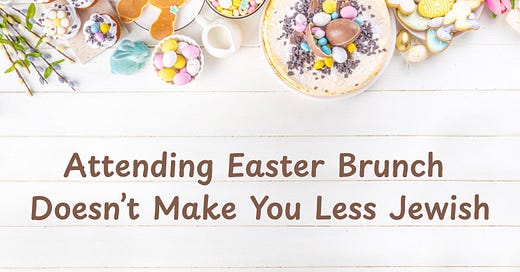According to the 2020 Pew Research Study on American Jews, approximately 900,000 Jews will do something to “celebrate” Easter today, This represents about 12% of American Jews, which is around 1/3 of Jews who live in a household with someone who grew up Christian (approximately 27%-33% of all American Jews).
If anything, I’m surprised these numbers are not higher, and most likely they have grown over the last 5 years. For comparison, in the same study, approximately 30% of American Jews said they do something to celebrate Christmas. This is also not surprising, but I want to know so much more!!
The 2020 Pew study did an incredible job of providing a snapshot of demographics and behavior in the American Jewish world. What it didn’t do is help us understand the feelings and emotions associated with these various behaviors. I have so many more questions that I would love to ask all these respondents, questions that get at the “why” behind the behavior.
For those who celebrate Easter, I want to know:
“Is celebrating Easter meaningful, awkward, or purely social for you?”
“Do you feel conflicted about celebrating Easter?”
“Does participating in Easter create tension with your Jewish identity?”
For those who celebrate Christmas but not Easter, I want to know:
“Why do you celebrate Christmas but not Easter?
“What is it about Christmas that you find meaningful or compelling?”
"Do you view Easter as a more religious holiday than Christmas?"
"Would you consider celebrating Easter if it were framed in a non-religious, family-oriented way?"
Maybe next time, Pew.
I have my own hypotheses about how folks may answer these questions based both on my personal experience and also on the conversations I’ve had with hundreds of Jews who are part of interfaith families.
I grew up celebrating both Christmas and Easter with my dad’s side of the family. This celebrations centered around meals in someone’s home, sometimes ours, sometimes my grandparents, sometimes an aunt and uncle’s home. We never attended church and there were never any religious aspects to the home celebrations, not even a prayer before the meal. And yet, if I were asked these questions, my answers would have varied significantly over the years, particularly between the ages of 13-17.
Today, I feel very firm in my understanding of what it means to celebrate Christmas or Easter as a Jew, but there was a time when that was not the case. And so, to any of you 900,000 Jews out there who are going to Easter brunch today, I want to tell you:
Attending Easter brunch does not make you less Jewish. Painting Easter eggs does not make you less Jewish. Opening a Easter gift basket doesn’t make you less Jewish. Even attending church with your family, doesn’t necessarily make you less Jewish.
Sitting in a church service and accepting Jesus in your heart, that’s an entirely different story. But sitting next to a parent or loved one who wants you to be there, that act, in and of itself, does not automatically compromise your Jewish identity.
What does it really mean to “celebrate” something?
After all these years of studying this topic, I still find the birthday party analogy to be the most compelling and also the most straight-forward for folks to understand. Say you get invited to a birthday party for a friend… you attend, you participate in the games, you eat the cake, you give a present. Did you celebrate the birthday? You did. Was it your birthday? No, it was not.
I think the same is true for Jews who celebrate Christian holidays with their Christian family members. Participating in the rituals and traditions enhance the celebration of your loved ones. Imagine not eating the cake at someone’s birthday celebration because it isn’t your birthday. The same applies here. If you’ve been invited to celebrate Easter with a loved one and you decline because it isn’t your holiday, you may be taking away from your loved ones ability to find joy and meaning in the holiday. Being with you is part of the way they celebrate.
Celebrating Easter with someone who asks you to join is a mitzvah, not a compromise of Jewish identity.
This doesn’t mean Jews should let go of all boundaries. If ham isn’t part of your practice, don’t eat the ham. If you are still observing Passover, don’t eat the bread. If a particular ritual feels uncomfortable (a prayer invoking Jesus’s name), don’t say “amen” at the end. If someone asks you an uncomfortable religious question, you don’t need to answer it.
I know that there are many Jews who encounter these types of challenges on Easter, and also on Christmas, and I don’t want to downplay these challenges. Family dynamics can be extremely difficult to navigate and I urge you to reach out to the clergy in your life who can help you through any challenging dynamics with family members who are trying to save your soul. It happens, it is serious, and Jewish clergy are here to support you through it.
But most of the time, for most of the people I’ve connected with, Easter celebrations focus more on family gathering than on forced religious practice. And even for families who do have deeper religious practices, there are still ways to navigate the celebration while upholding one own’s religious integrity.
My hope is that there will be less negative stigma within the Jewish community for those who attend these celebrations. 900,000 is not an insignificant number of Jews, and most likely you knew at least a few of them.
If you are one of them, I see you.
If you are not one of them, I hope you will offer support and encouragement to the Jews in your life who are attending an Easter celebration today. They are not bad Jews or any less Jewish than you.
Wishing a Happy Easter to all who celebrate.




